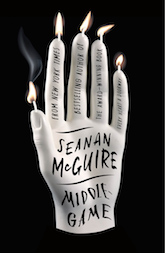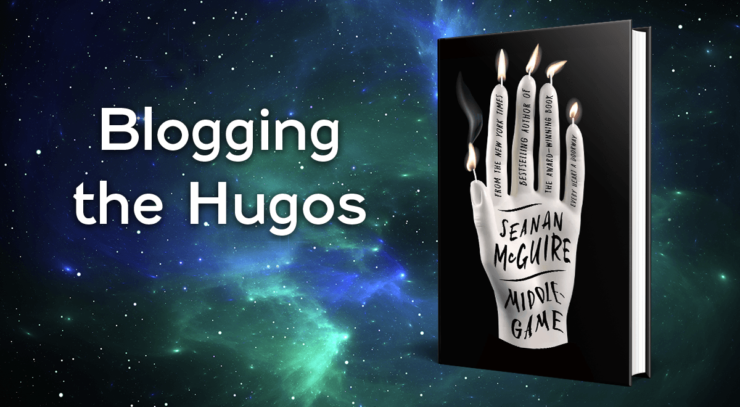In the lead-up to the 2020 Hugo Awards, we’re taking time to appreciate this year’s best novel Finalists, and what makes each of them great.
Seanan McGuire is a fascinating writer because she is so many different writers. I’m not just referring to the fact that she’s got a pretty successful side gig writing horror under the pen name Mira Grant (funnily enough, Grant has four Best Novel Hugo nominations to McGuire’s one). But even the books published solely under her own name reveal that she contains multitudes: Her October Daye series is the stuff of classic urban fantasy. The Incryptid books are marketed as urban fantasy too, but they are a lot lighter and looser and funnier than the genre classifier might suggest.
McGuire’s written haunting ghost stories and she’s written for kids and she’s written superhero comics and she’s written a stunning series of novellas interrogating and invigorating portal fantasy tropes (picking up an award or two for those along the way). And she’s written Middlegame, a 530-page doorstopper of an apocalyptic science fantasy. It’s appropriate that this is her first novel under her own name to receive a Hugo nod, because it’s the best novel she’s ever written (I say that with some certainty, despite not technically having read them all; reading all of Seanan’s novels would be an endeavor unto itself), but also because it seems like the natural culmination of her career to date: a novel filled with everything that makes a Seanan McGuire book, just a lot more of it.
Roger and Dodger are twins, but they didn’t grow up together, because they are anything but normal. Separated at birth and raised by different families on opposite sides of the country, they are both geniuses of a different sort: Roger can feel the way language can bend and influence the world, while Dodger can see the mathematical equations that give it structure. Even before they understand their abilities or have the power to harness them with intent, they are dimly away that they are magical—because they are also vividly aware of one another, able to converse mind-to-mind even though they’ve never met.
Buy the Book


Middlegame
The twins are indeed magical, if you want to call it that. They were created through a form of alchemy by a madman, James Reed—himself the creation of another scientist-magician, a dead woman who was known as Asphodel to her peers in the Alchemical Congress and as A. Deborah Baker to the legions of children who grew up reading her book, a beloved Oz-like fable about children on a quest to discover an impossible city. But if you’ve read Seanan McGuire before—particularly her Wayward Children novellas, which are about children slipping into other worlds and back—you won’t be surprised to learn A. Deborah Baker’s Over the Woodward Wall isn’t just a story, but a veiled, allegorical guidebook to unlocking the godlike powers buried within humanity. Asphodel never completed her life’s work (getting murdered by one of your experiments will do that to a person). Reed, her creation, is bent on surpassing her achievements and, through Roger and Dodger, opening the doorways of infinity. Too bad no one told the kids.
Could you make sense of that paragraph? It’s kind of exhausting, trying to tell you what this book is about, because it seems to be about everything: science and language and math and magic and murder and betrayal and love and the end of the world. But all you really need to know is that it is about a pair of broken, traumatized kids who, through their inexplicable bond, make a good-faith effort to fix each other, and hopefully the broken world along with them. It’s a love story of sorts—yes, these are siblings, and no, not love like that. But the vast majority of the book, which unfolds across more than a decade, as the two children grow up, become aware of one another, save one another, lose one another, and finally come together just in time for everything to get really fucked up, is simply about how trauma can weigh down a life, and how experiencing shared trauma can sometimes help lighten that load.
The apocalyptic goings-on that hang over their bildungsroman—the book alternates between Roger and Dodger’s points of view, with occasional ominous interludes featuring Reed and his gang of villainous henchmen (just wait until you find out the secret behind that waxy hand that adorns the cover)—are undeniably thrilling, though I do admit I occasionally had trouble following them. Seanan McGuire is a meticulous writer, and I know for a fact she has perfectly mapped out how her science and magic work and intersect (her worldbuilding is so thorough she even wrote the entirety of Over the Woodward Wall, snippets of which we encounter throughout Middlegame), but piecing together the glimpses of the whole she gives us can be a challenge.
No matter: This is a character story, epic Stephen King-meets-X-Men trappings aside, and Roger and Dodger are irresistible characters. When we meet them as kids, they seem like real kids, frustrated at being small and powerless (though they are far from powerless); their genius makes them strange, makes them targets. They grow up damaged but not alone, because they always exist for one another as voices in their heads (and later in flesh and blood). Their journey to adulthood is harrowing and terrifying, but then… aren’t they always?
Joel Cunningham was the founding editor of the B&N Sci-Fi & Fantasy Blog (RIP), where he explored the galaxy for 5 years, picking up a Hugo Award (well, tangentially) along the way. He’s now managing editor of Lifehacker, which means he’s managing at least one thing nowadays. He lives in an apartment in Brooklyn with his wife and two children and hopes to go outside again someday. He tweets @joelevard.










